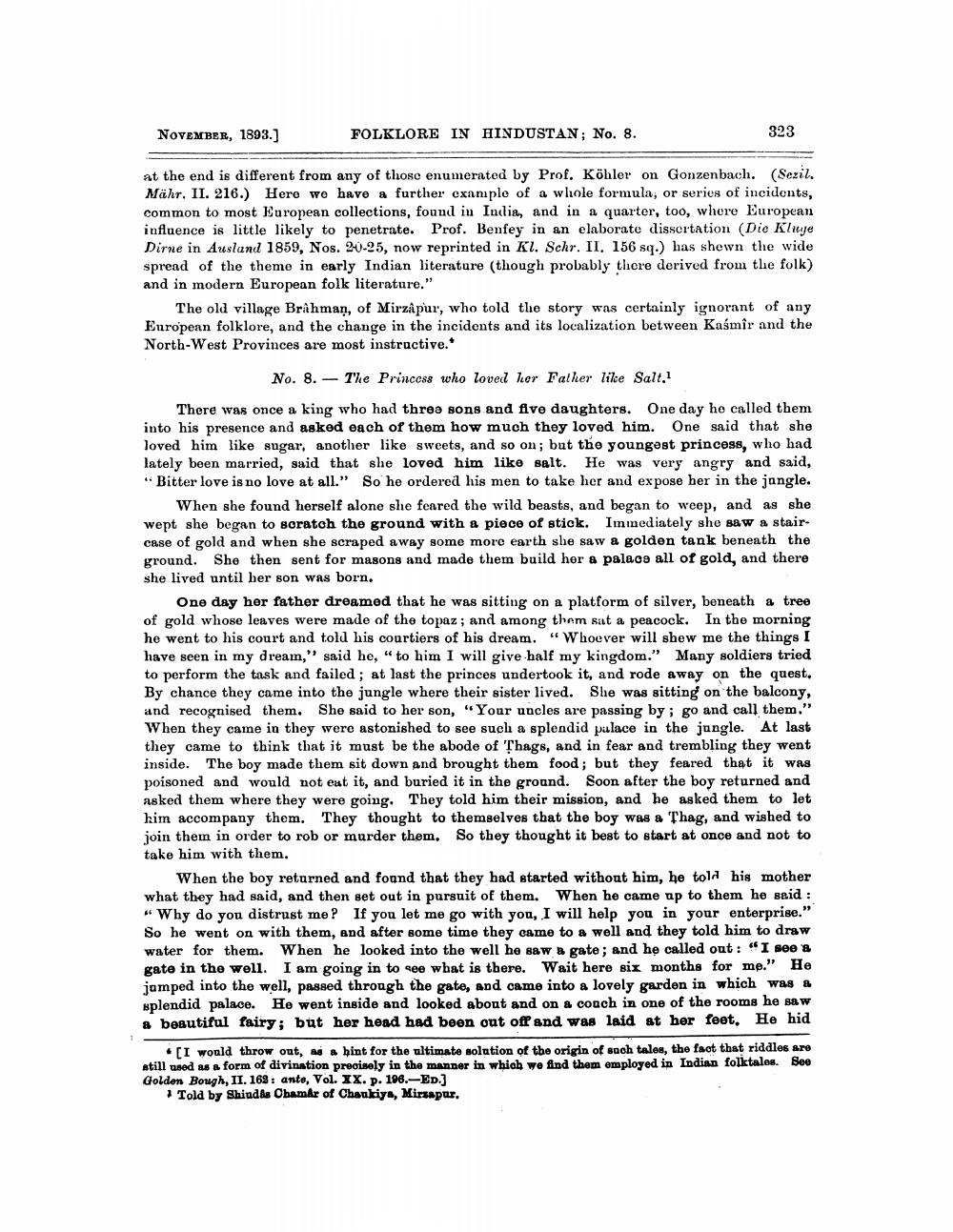________________
NOVEMBER, 1893.]
FOLKLORE IN HINDUSTAN; No. 8.
323
at the end is different from any of those enumerated by Prof. Köhler on Gonzenbach. (Sexil. Mähr. II. 216.) Here we have a further example of a whole formula, or series of incidents, common to most European collections, found in India, and in a quarter, too, where European influence is little likely to penetrate. Prof. Benfey in an elaborate dissertation (Die Kluye Dirne in Ausland 1859, Nos. 20-25, now reprinted in Kl. Schr. II, 156 sq.) has shewn the wide spread of the theme in early Indian literature (though probably there derived from the folk) and in modern European folk literature."
The old village Brahman, of Mirzapur, who told the story was certainly ignorant of any European folklore, and the change in the incidents and its localization between Kasmir and the North-West Provinces are most instructive."
No. 8. — The Princess who loved her Father like Salt.
There was once a king who had threa sons and five daughters. One day he called them into his presence and asked each of them how much they loved him. One said that she loved him like sugar, another like sweets, and so on; but the youngest princess, who had lately been married, said that she loved him like salt. He was very angry and said, "Bitter love is no love at all." So he ordered his men to take her and expose her in the jungle.
When she found herself alone she feared the wild beasts, and began to weep, and as she wept she began to scratch the ground with a piece of stick. Immediately she saw a staircase of gold and when she scraped away some more earth she saw a golden tank beneath the ground. She then sent for masons and made them build her a palace all of gold, and there she lived until her son was born.
One day her father dreamed that he was sitting on a platform of silver, beneath a tree of gold whose leaves were made of the topaz; and among them sat a peacock. In the morning he went to his court and told his courtiers of his dream. “Whoever will shew me the things I have seen in my dream," said he, "to him I will give half my kingdom." Many soldiers tried to perform the task and failed; at last the princes undertook it, and rode away on the quest. By chance they came into the jungle where their sister lived. She was sitting on the balcony, and recognised them. She said to her son, "Your uncles are passing by; go and call them." When they came in they were astonished to see such a splendid pulace in the jungle. At last they came to think that it must be the abode of shags, and in fear and trembling they went inside. The boy made them sit down and brought them food; but they feared that it was poisoned and would not eat it, and buried it in the ground. Soon after the boy returned and asked them where they were going. They told him their mission, and he asked them to let him accompany them. They thought to themselves that the boy was a Thag, and wished to join them in order to rob or murder them. So they thought it best to start at once and not to take him with them.
When the boy returned and found that they had started without him, he told his mother what they had said, and then set out in pursuit of them. When he came up to them he said: * Why do you distrust me? If you let me go with you, I will help you in your enterprise." So he went on with them, and after some time they came to a well and they told him to draw water for them. When he looked into the well he saw a gate; and he called out: "I see a gate in the well. I am going in to see what is there. Wait here six months for me." He jumped into the well, passed through the gate, and came into a lovely garden in which was a splendid palace. He went inside and looked about and on a coach in one of the rooms he saw a beautiful fairy; but her head had been out off and was laid at her feet. He hid
• [I would throw out, as a hint for the ultimate solution of the origin of such tales, the fact that riddles are atill used as a form of divination precisely in the manner in which we find them employed in Indian folktales. See Golden Bough, II. 168: ante, Vol. XX. p. 196.-ED.]
* Told by Shiadas Chamar of Choukiya, Mirsapur.




